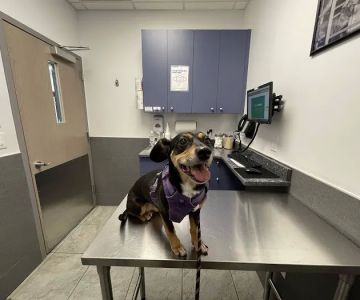What Grades Do You Need to Be a Veterinarian? A Comprehensive Guide
- Veterinary School Requirements
- What GPA Do You Need for Veterinary School?
- High School Grades Needed for a Career in Veterinary Medicine
- Pre-Veterinary Programs and Their Impact on Your Grades
- Real-Life Case Studies: What It Takes to Get Into Vet School
- Tips to Improve Your Grades and Get Into Veterinary School
1. Veterinary School Requirements
Becoming a veterinarian is an ambitious goal, and the road to veterinary school can be long and competitive. One of the most common questions aspiring vets ask is about the grades they need to get into veterinary school. To begin, veterinary school is highly selective, and most schools require students to meet certain academic criteria, including strong grades in specific subjects such as biology, chemistry, and physics.
For those wondering if their grades are enough to pursue a veterinary career, it's important to remember that your GPA, while critical, is not the only factor considered by veterinary schools. Veterinary school admissions committees look for well-rounded applicants, which means that while high grades are important, experiences such as volunteer work, animal care, and internships will also play a crucial role. However, to even be considered for most veterinary programs, you'll need to meet certain academic benchmarks.
Each veterinary school has its own set of admission requirements, but in general, most schools require candidates to have a strong background in the sciences, including coursework in biology, chemistry, physics, and math. These prerequisites ensure that future veterinarians have the necessary foundation to succeed in the rigorous veterinary curriculum. So, what exactly do your grades need to look like? Let’s break it down further.
2. What GPA Do You Need for Veterinary School?
When applying to veterinary schools, one of the most important factors in the application process is your GPA. The GPA requirement can vary by school, but most veterinary programs are very competitive and typically expect applicants to have a minimum GPA of 3.5 or higher. However, some top veterinary schools may expect even higher GPAs, particularly in the core science courses like biology and chemistry. If you’re applying to a highly competitive veterinary school, a GPA of 3.7 or higher may be more in line with what you need to get noticed by admissions committees.
Additionally, veterinary schools place a strong emphasis on the grades you earn in science courses. A high GPA in non-science courses is beneficial, but admissions committees will be paying special attention to your performance in subjects that are critical to the field of veterinary medicine. This includes courses such as biology, organic chemistry, microbiology, and physics. These courses form the foundation for the study of veterinary medicine and demonstrate your ability to handle the academic rigor of veterinary school.
If your GPA is not as high as you’d like, don’t panic. Many veterinary schools also consider factors such as work experience, extracurricular activities, and letters of recommendation. That being said, maintaining a solid GPA, especially in the sciences, will undoubtedly improve your chances of acceptance into a veterinary program.
3. High School Grades Needed for a Career in Veterinary Medicine
If you’re still in high school and wondering what grades you need to pursue a career in veterinary medicine, the foundation starts early. Although most veterinary schools require a college degree before applying, your high school grades play an important role in setting you up for success later. You should aim for excellent grades in core subjects like biology, chemistry, and mathematics.
It’s also beneficial to take advanced courses in science and math, such as Advanced Placement (AP) Biology, AP Chemistry, or other honors courses, to strengthen your academic profile. These courses not only prepare you for the types of subjects you’ll encounter in veterinary school but also show veterinary schools that you are capable of handling challenging coursework. Moreover, high grades in these courses can improve your chances of getting into a good undergraduate program, which is the next step toward veterinary school.
If you’re considering a veterinary career while still in high school, it’s also a good idea to gain experience in animal care through volunteering at local shelters, animal hospitals, or farms. This will give you a glimpse into the responsibilities and tasks involved in veterinary care and further confirm your interest in the field.
4. Pre-Veterinary Programs and Their Impact on Your Grades
Many students interested in becoming veterinarians pursue pre-veterinary programs during their undergraduate studies. Pre-vet programs are designed to help students meet the academic prerequisites for veterinary school, including courses in biology, chemistry, and physics. Enrolling in a pre-vet program can help ensure that you take the right courses, stay on track with your studies, and prepare for the veterinary school application process.
Pre-veterinary programs are often rigorous and competitive, so maintaining a high GPA is essential. Many pre-vet students find that the academic workload is challenging, as it combines demanding coursework with extracurricular activities and volunteer work. It’s crucial to stay organized and focused to succeed in a pre-vet program. Additionally, having strong grades in a pre-vet program can make you a more competitive applicant when applying to veterinary schools.
In some cases, students may choose to pursue a biology or animal science degree before applying to veterinary school if a formal pre-vet program is not available. Either way, maintaining high grades throughout your undergraduate studies is key to getting into a good veterinary school.
5. Real-Life Case Studies: What It Takes to Get Into Vet School
Let’s take a look at some real-life examples of what it takes to get into veterinary school, based on the experiences of recent veterinary school applicants. One such case is Sarah, who had a GPA of 3.6 and spent significant time volunteering at an animal shelter. Sarah’s strong application, including her hands-on experience, passion for animals, and solid academic performance, helped her gain admission to a competitive veterinary school in the Midwest.
Another example is Jason, who struggled with chemistry in college but worked hard to improve his grades by seeking help from tutors and attending study groups. Jason’s GPA was slightly lower than the typical range for veterinary school applicants, but his determination, work ethic, and volunteering experience helped him stand out. He was admitted to a well-respected veterinary program, proving that perseverance and dedication can make a difference when grades aren’t perfect.
These examples show that while grades are important, they are not the only factor that veterinary schools consider. If you are passionate about becoming a veterinarian, focus on gaining relevant experience, maintaining strong grades in the required subjects, and presenting a well-rounded application.
6. Tips to Improve Your Grades and Get Into Veterinary School
If you're worried about your grades and want to improve your chances of getting into veterinary school, here are a few tips that can help:
- Focus on Core Science Courses: Make sure to prioritize your grades in biology, chemistry, and physics, as these are the most important subjects for veterinary school admissions.
- Seek Help When Needed: If you’re struggling in any class, don’t hesitate to ask for help. Tutors, study groups, and online resources can provide the support you need to succeed.
- Get Practical Experience: Spend time volunteering or working with animals. This experience will not only enhance your application but also show your commitment to the field of veterinary medicine.
- Stay Organized: Create a study schedule and stick to it. Staying organized can help you manage your time effectively and avoid falling behind in your coursework.
- Participate in Extracurricular Activities: Veterinary schools also value extracurricular activities that demonstrate leadership, commitment, and a passion for animals.
By following these tips, you can improve your grades and strengthen your application to veterinary school. The path to becoming a veterinarian may be challenging, but with dedication, hard work, and a focus on the right grades and experiences, it is certainly achievable.











